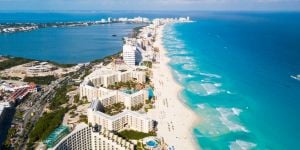Water quality in Mexico
Last activity 15 March 2018 by travellight
2961 Views
31 replies
Subscribe to the topic
Post new topic
I went to zihuatanejo this past June . The woman I stayed with was soaking all her fruits and vegetables in iodine solution to desinfect and told me not to use regular tap water for washing fruits or drinking because it was bad. Is there an area in Mexico where the water is good to drink?
Thank you.
It could be a problem in Zihuatanejo, but not all of Mexico. I use Microdyn to soak tomatoes and strawberries in. All others, I use tap water. Most people in Mexico do not drink the water, but use bottled water bought in 20 liter jugs. Although the water maybe good, it is a habit to use bottled water for this purpose.
Itobys wrote:I went to zihuatanejo this past June . The woman I stayed with was soaking all her fruits and vegetables in iodine solution to desinfect and told me not to use regular tap water for washing fruits or drinking because it was bad. Is there an area in Mexico where the water is good to drink?
Thank you.
That's a very complex issue. Generally speaking it is likely much safer that tap water in the U.S Most areas in Mexico do not use chlorine or fluoride in their water. They were happily drinking their water until bottled water companies came to town.
Your friend is in my opinion, way over doing the disinfecting of things. Soap and water will clean off the fruit fine. I also add some vinegar to try to cut any pesticide. I would be drinking bottled, and using tap for cleaning would be safe in most of Mexico.
Hi Itobys,
It is best to disinfect fruits and vegetables in any country as they contain pesticides, bacteria, and other contaminants. I never understood why it is that people in the US don´t do it.
I use either white vinegar or Microdyn, an iodine product sold in most Mexican stores and pharmacies.
Regarding drinking water... There is no place in Mexico that I know of where drinking tap water is safe. People either have water purification / filtration systems installed or they purchase 5 gallon jugs of water available from Agua Ciel, Santorini, Bonafont, and other water delivery services.
Melanie
Like "travellight" said, it's a complex issue. We always rince our veggies with water (tap or purified), tap to remove dirt, sand, etc. Desinfect with water combined with chlorinev (see info on chlorine bottle). We also buy lettuce mainly Romaine, we just remove first leaves and eat it, never got sick.
We always drink purified water from local providers not Ciel cheaper and as safe, you could also add chlorine bleach (see info on label).
We use tab water for cleaning teeths.
Bottom line, trial and error.
PS: we also rince our veggies when leaving in Canada to residues.
Adios, GyC.
mexicogc wrote:Like "travellight" said, it's a complex issue. We always rince our veggies with water (tap or purified), tap to remove dirt, sand, etc. Desinfect with water combined with chlorinev (see info on chlorine bottle). We also buy lettuce mainly Romaine, we just remove first leaves and eat it, never got sick.
We always drink purified water from local providers not Ciel cheaper and as safe, you could also add chlorine bleach (see info on label).
We use tab water for cleaning teeths.
Bottom line, trial and error.
PS: we also rince our veggies when leaving in Canada to residues.
Adios, GyC.
I would strongly advise against chlorine in any form. Recent research is showing a correlation of increased cancer and chlorine.
If you are concerned wipe the item with Hydrogen peroxide. Your body naturally makes hydrogen peroxide, it does not make chlorine, or bleach.
I research a lot, and read the current information, because that has been my job and background for many years.
costco and sams club have very high quality filters that can be hooked to your tap or fill yourself, Beds Bath and Beyond most of the major department stores. This is the safest way for us. If you get your water by truck this is not safe if you are used to drinking water in Canada / US and similar country, from our own experience.
Your other option is boiling and let it cool down then put in refrigerator.
travellight wrote:]
I would strongly advise against chlorine in any form. Recent research is showing a correlation of increased cancer and chlorine.
If you are concerned wipe the item with Hydrogen peroxide. Your body naturally makes hydrogen peroxide, it does not make chlorine, or bleach.
I research a lot, and read the current information, because that has been my job and background for many years.
No recent research has shown any correlation in increased cancer and chlorine. I have yet to hear of anytime where the body naturally makes hydrogen peroxide. Research or not, this is not true.
Do not use chlorine (a lot of cities do use in water under controlled situations) look on a bleach bottle it will tell you it is poison / acid. A lot depends on the strength. I worked with this when I was working a summer job in Vancouver taking large Valves out of the pipelines and rebuilding them. the sign you are looking for on Hazardous materials is skull and cross bones
Look in the " hazards material list' for Canada / US
joaquinx wrote:travellight wrote:]
I would strongly advise against chlorine in any form. Recent research is showing a correlation of increased cancer and chlorine.
If you are concerned wipe the item with Hydrogen peroxide. Your body naturally makes hydrogen peroxide, it does not make chlorine, or bleach.
I research a lot, and read the current information, because that has been my job and background for many years.
No recent research has shown any correlation in increased cancer and chlorine. I have yet to hear of anytime where the body naturally makes hydrogen peroxide. Research or not, this is not true.
Sorry joaquinx, I don't just make this stuff up. Much of this is well known by those in medicine. Medicine is my background and reading the latest research is a continued interest of mine.
https://www.sciencedaily.com/releases/2 … 134129.htm
"Hydrogen peroxide, the same mild acid that many people use to disinfectant their kitchens or treat cuts and abrasions, is also produced by the body to keep cells healthy. Now, researchers have solved how part of this complex process works.
Share:"
https://www.ncbi.nlm.nih.gov/pubmed/8487327 "CONCLUSION:
"These results suggest that organic byproducts of chlorination are the chemicals of greatest concern in assessment of the carcinogenic potential of chlorinated drinking water."
"The body also produces the enzyme catalase, which breaks down hydrogen peroxide into water and oxygen. Or at least it does for a while. As we age, catalase production tails off, leaving nothing to transform the hydrogen peroxide into chemicals the body can release." Is your hair gray ? That is the hydrogen peroxide you don't believe in. it believes in you .
Itobys wrote:I went to zihuatanejo this past June . The woman I stayed with was soaking all her fruits and vegetables in iodine solution to desinfect and told me not to use regular tap water for washing fruits or drinking because it was bad. Is there an area in Mexico where the water is good to drink?
Thank you.
Depends where you are. There are places where you can drink the tap water and there are those where you cannot. If in doubt ask a local.
Hello,
We wash our fruits and vegetables with iodine in tap water for visitors (more sensitive to new bacteria) and switch back to just tap water when they leave. This is in Nayarit.
I work in food safety but am not a physician so here's my non-medical explanation... Most people are perfectly capable of handling the normal bacterial load of tap water where they have lived for a long time. Any new people can have a bit of intestinal problems, up to a lot of intestinal problems, when they go to a new place. The hotter the climate, the older the water system and the longer he water stays in warm pipes, the higher the risk of being sick... So if your friend knows that her water sometimes upsets people's system, she is better off using iodine. You know, you need iodine in your system for your thyroid and a lot of women don't get enough iodine in their diet, so it can be a win-win (if you are a glass half-full kind of person :-)).
Now about using soap, vinegar and commercial veggie wash stuff... Soap is not a good idea because the residue is not good for you. You need to wash fruits and veggies with water, a stiff brush (as stiff as the fragile fruits will tolerate) and get dirt off. Soaking in water with vinegar is a common practice in latin America and while i doesn't help as much as people think for pesticides, it does extend the shelf life of a lot of fruits because it inhibits mold. With that, strawberries will keep a few days! There are mixed reports about effectiveness to prevent sickness, but there are no negative effects, so positive outweighs negatives!
I believe in Microdyn. It is so effective that it can cure athletics foot and other fungus infections.
I love it too, so simple and yet so effective!
I was using cloro,it worked well for me.
janiedubois wrote:Hello,
We wash our fruits and vegetables with iodine in tap water for visitors (more sensitive to new bacteria) and switch back to just tap water when they leave. This is in Nayarit.
I work in food safety but am not a physician so here's my non-medical explanation... Most people are perfectly capable of handling the normal bacterial load of tap water where they have lived for a long time. Any new people can have a bit of intestinal problems, up to a lot of intestinal problems, when they go to a new place. The hotter the climate, the older the water system and the longer he water stays in warm pipes, the higher the risk of being sick... So if your friend knows that her water sometimes upsets people's system, she is better off using iodine. You know, you need iodine in your system for your thyroid and a lot of women don't get enough iodine in their diet, so it can be a win-win (if you are a glass half-full kind of person :-)).
Now about using soap, vinegar and commercial veggie wash stuff... Soap is not a good idea because the residue is not good for you. You need to wash fruits and veggies with water, a stiff brush (as stiff as the fragile fruits will tolerate) and get dirt off. Soaking in water with vinegar is a common practice in latin America and while i doesn't help as much as people think for pesticides, it does extend the shelf life of a lot of fruits because it inhibits mold. With that, strawberries will keep a few days! There are mixed reports about effectiveness to prevent sickness, but there are no negative effects, so positive outweighs negatives!
I was going to let this one slide, but it worried me too much. As you say you are "not a physician", but you "work in food safety", in Mexico?, as a ? Scientist? tester? health coach ?
Some of what you advise is good advice," stiff brush rinsing" but some of the other things have risks. Iodine for instance can be very hard on a thyroid so that would not be the first thing I would reach for. You can get iodine in food without having to take the risk of compounding a thyroid problem.
Actually just rinsing, not soaking veggies and fruits can be very effective. Vinegar is an excellent germicide, and cuts oil and grease. Soap is a suficant, it reduces surface tension. Vinegar breaks down soap. Soap is natural if it is just soap ( I use a citrus based natural soap) soap is not detergent. Minerals associated with water minerals leave a film which vinegar can break. Silver is okay but if you over do you can turn grey, it is not found in the body in more than infinitesimal parts. Bleach is a toxic product developed in WWI that should never be found in the body or used on it.. Commercial veggie washes are a major waste of money and they do leave chemical residuals.
There is an adjustment period when you move to a new country, a period where your body adjust to the new guests in your microbione.. Normally in a couple of months you will be fine with the food and clean water.
Melanie, just a bit of info, we have stayed in Cancun for over 25 years and never bought bottled water as the treatment system is second to none in our experience. However outside the city such as Mayan Riviera or Playa is a whole other story.
We are exploring Campeche. Any advice on that part of the country in this regard, drinking water treatment, quality?
Les kadar wrote:Melanie, just a bit of info, we have stayed in Cancun for over 25 years and never bought bottled water as the treatment system is second to none in our experience. However outside the city such as Mayan Riviera or Playa is a whole other story.
We are exploring Campeche. Any advice on that part of the country in this regard, drinking water treatment, quality?
The water in Campeche is loaded with minerals, so I buy bottled which is delivered. The governor of Campeche has been aiming the city in the Cancun direction, so currently we have construction chaos all over the city. I have no concerns about bathing , washing things, and brushing my teeth in the main water source. I soak my toothbrush in hydrogen peroxide. Much of the problem is adapting to a new environment. In the U.S. I try to never use tap water, because it has it's problems which include fluoride and chlorine.
Cancun has filtering systems on most if not all of the HOTEL properties. Some may use chlorine. I prefer to not bath in or drink chlorine.
As I look at buying a home in Mexico I already know I want city water and my home will have a water softener, and my drinking/cooking water will be filtered with reverse osmosis. There are still no guarantees but the statistical probabilities of not drinking something I shouldn't are in my favor if I plan ahead.
I knew very little about water until I moved to the farm homesteaded by great-grandparents. My water woes are a long story, but to make it short, I eventually jumped through a dozen hoops and ran a mile long water line from the town to the farm.
Everyone above is right in regards to their stated, specific set of circumstances. Water treatment is a complicated and fascinating subject (see Wikipedia for an overview). Are we talking about water from a well that was dug in an agricultural area? A lake? A river? Or the brown water (if you don't know what that is you may NOT want to) that is treated and returned to your home through the city water system?
Gas tanks are stored underground and nothing last forever. Most underground gas tanks have leaked and contaminated the ground water (a dirty little secret we keep under-wraps). When were the the city water pipes put in? Many older areas have lead in the water as a result of the pipes that were used. Then there is the cistern -- plain old rain water. At first glimpse that sounds great. Think again. Before the water gets to the cistern it washes bird poop and many other biological contaminates into the cistern with it. We had a sophisticated cistern on the farm; filtered through charcoal... etc. What about fluoridated city water? There are so many situations and concerns it would take volumes to list all of the problems and solutions to drinking water.
I have kidney problem and every time I take hot bath unfiltered, I do not feel good. I will sweat at night and be nauseous and have no appetite in the morning. This is how bad the chlorine is on my kidney. So now I use filtered water to make a foot bath only. I feel file. Even hot shower makes me sick because of chlorine. I am thinking about whole house filter but it is around $3K to install. Not sure if I want it since I am thinking of selling my home. If I decide to stay, then I will put it in. But chlorine is really bad for you. All organs suffer. When you are healthy, you really do not feel it but it is not good.
I live in a small ville in a national park. There are a few wells here filled by run-off from the mountains. It's good enough to drink although I buy garafones. Local tap water comes from those wells.
But I know other areas don't have that luxury. The best advice I ever heard here was the reminder that ice is also water (:
I once lived in Zigua. The water there was deadly!
I went to Zihua last summer. I did not drink that water. I was told not to. I soaked all my fruits and veggies in iodine solution before doing anything to them.
On the outskirts of GDL.
You know I've often wondered about the bottled water. Those osmosis filters are expensive. Do you think they are worried about the public's health if they get old and unusable? The best defence is what you acquire naturally after years of living here.
I was a virgin when I lived in Zihua. That was maybe the sickest I've ever been.
I never got sick from water there because I knew not to drink. I ate out a lot, had iced drinks and was just fine. But my face got swollen from heat and humidity so bad. I never seen myself looking like that before. It was terrible. It was in June. I rented airbnb room from one expat and did not like it. So after 4 days I moved to a hotel where I could use quiet AC and sleep well. The swollen face went away after one day in the hotel. But I did not like Zihua. The pictures online are better than the reality was.
Bad water here. u can use it to cook with as long as it boils for more than 5 minutes. buy a 10 liter bottle at the store. i use one bottle per week
I think that's boil for 30 minutes. That kills everything but spore forms. You'd need an autoclave for that.
"Boiling water kills or inactivates viruses, bacteria, protozoa and other pathogens by using heat to damage structural components and disrupt essential life processes (e.g. denature proteins). Boiling is not sterilization and is more accurately characterized as pasteurization. Sterilization kills all the organisms present, while pasteurization kills those organisms that can cause harm to humans."
Further Concerns and SafetyI need to clear up a common misconception. Some people are under the impression that they can remove toxins from water by boiling it. Boiling water kills harmful organisms but does nothing to remove toxic chemicals, compounds, salts, and metals.
gaby/allan wrote:Do not use chlorine (a lot of cities do use in water under controlled situations) look on a bleach bottle it will tell you it is poison / acid. A lot depends on the strength. I worked with this when I was working a summer job in Vancouver taking large Valves out of the pipelines and rebuilding them. the sign you are looking for on Hazardous materials is skull and cross bones
Look in the " hazards material list' for Canada / US
Household bleach is typically about 6% sodium hypochlorite making it a strong base. pH in the ~12.0 - 12.8 range.
Cleaning is generally done with pH reactions. Most of the substances that look dirty are acidic in nature so a base is effective for oxidation/cleaning.
Do not mix strong acids and bases. Such combinations can be toxic at the worst, inducing coughing at the very least.
American tap water has been a cocktail of ammonia, bleach/chlorine, and fluoride for quite some time. I can't seem to find out if municipal water supplies are in the habit of actually monitoring fluoride concentrations or just dumping a 50 lb bag in when the timing seems right. Here is a fluoride analyzer from a respected company: https://www.hach.com/fluoride/ca610-flu … 5547137079 At $7100, it does not appear simple to operate.
Here is a popular product for dumping into American tap water: https://www.amazon.com/Hexafluorosilica … +50+lb+bag
It also goes by the name of rat poison in many countries. As it was in the USA before they started dumping it in our water. There exists youtube videos of the product being dumped into tap water.
I can only wonder how our gut bacteria may respond to the triple cocktail of bleach, ammonia, and fluoride. Also, fluoride is administered in many bottled water products.
Having said all that, fluoride is good for the teeth in small amounts. Larger amounts are, well, rat poison. Fluoride is known for making animals lethargic.
I have owned and operated Adams Aquatics for 25 years. Water is a specialty.
Well soft down,
"fluoride is good for the teeth in small amounts." Nope not really , it destroys the teeth and bones, as well as much of your body particularly the brain. The areas where it occurs naturally have a population with lower I.Q.'s
What they are dumping in the water is not natural, it is a byproduct of aluminum production. None of the stuff the U.S. is putting in the water is healthy and good.
I did some research on the water quality in Merida and found a few useful links. Applied Geologydid some extensive research on nitrates. Research Gate has a good amount of science on the water. Their conclusion: Sampling of numerous wells in the unconfined karstic li-
mestone aquifer underlying the city of Merida has confirmed that contamination of the upper part of the fresh water aquifer is occurring. This phenomenon is a result
of the urbanization process."
It's important information for me; my dad is elderly so water quality makes a difference when it comes to his health. It's a given: I need a water softener and reverse osmosis -- still, I'll have the water tested and take the experts advice. I already know what a doctor will say... Water in the US has almost as many problems so poor water quality is a problem almost everywhere in the world. Water filtration systems, when prescribed by an MD are a tax deductible health care expense in the US. That speaks volumes about US water quality 
4theloveofsun wrote:I did some research on the water quality in Merida and found a few useful links. Applied Geologydid some extensive research on nitrates. Research Gate has a good amount of science on the water. Their conclusion: Sampling of numerous wells in the unconfined karstic li-
mestone aquifer underlying the city of Merida has confirmed that contamination of the upper part of the fresh water aquifer is occurring. This phenomenon is a result
of the urbanization process."
It's important information for me; my dad is elderly so water quality makes a difference when it comes to his health. It's a given: I need a water softener and reverse osmosis -- still, I'll have the water tested and take the experts advice. I already know what a doctor will say... Water in the US has almost as many problems so poor water quality is a problem almost everywhere in the world. Water filtration systems, when prescribed by an MD are a tax deductible health care expense in the US. That speaks volumes about US water quality
At least Mexico does not add fluoride and chlorine isn't necessarily a given except in hotels. Why do you use a water softener? do you supplement to replace the minerals those systems remove ?
Articles to help you in your expat project in Mexico
 Dating in Mexico
Dating in MexicoWe can recognize an intrinsic spark of love in the Mexican culture, "la serenata." Remember that ...
 Leisure activities in Mexico
Leisure activities in MexicoMexico has activities for everyone: from exciting adventure to peaceful relaxation, high culture to rowdy street ...
 Working in Cancun
Working in CancunCancun and surrounding areas are popular destinations for both tourists and expatriates alike. Cancun is the ...
 Accommodation in Cancun
Accommodation in CancunLike in other parts of Mexico, the best way to find accommodation in Cancun is by searching for one while ...
 Childcare and education in Mexico
Childcare and education in MexicoMany Mexicans' lives, young and old, revolve around family issues. Children are accepted on most social ...
 Travelling around Mexico
Travelling around MexicoOne of the best parts about living in Mexico is being able to travel across the country. Mexico may appear small ...
 Study in Mexico
Study in MexicoIf you're planning to move to Mexico with your family or choose to study there, here is all you need to know ...
 Buying property in Mexico City
Buying property in Mexico CityPeople travel from all across the globe to reside in Latin America because of its cultural richness and usually ...
Find more topics on the Mexico forum



